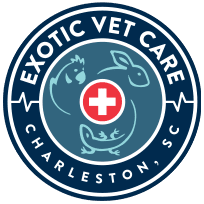Dental and Oral Disease in Lizards
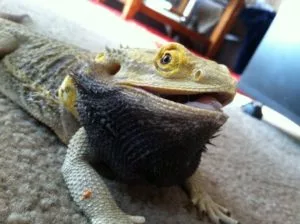
February is Pet Dental Health Month. While dogs and cats usually take the spotlight, lizards have toothy smiles to protect too!
Normal Anatomy
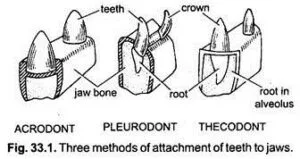
Image source: https://www.notesonzoology.com/mammals/dentition-in-mammals-vertebrates-chordata-zoology/8471
Lizards have lips, gums, and salivary glands similar to mammals. They also have many mucous glands in their mouth. The combination of mucous and salivary glands help lubricate their food for swallowing. Most lizards have 2 rows of teeth in both their mandibular and maxillary arcades. Lizards have either acrodont or pleurodont teeth.
Acrodont teeth are fused onto ridges on the occlusal surface of the maxilla and mandible. This makes them more fragile and susceptible to injury. In younger animals these teeth can be replaced. Older animals are less able to do this and their teeth can be worn down to the point that only the underlying ridges remain. Chameleons and bearded dragons have this dentition.
Pleurodont teeth are seated in ridges on the inner aspect of the maxilla and mandible. While this makes them easily broken off, they can be replaced throughout the reptiles entire life. The shape of pleurodont shape varies by species and can be highly specialized for the lizard’s diet. Geckos and iguanas have this dentition.
Predisposing Factors and Causes
Many factors can contribute to periodontal and oral disease. Husbandry issues are a huge contributor. Inappropriate diet can lead to deficiencies in vitamin A and calcium. Vitamin A is needed for proper function of the glands in the oral cavity and calcium is needed for appropriate growth. Deficiencies in either of these can make the mouth a better environment for secondary infections. Herbivorous and omnivorous species require fiber to strengthen and clean gingival tissues. When fed a low fiber diet, the gingival tissues become fragile and plaque can accumulate more. Trauma from live prey feedings (like mice and rats) can make a window for bacteria and fungus to invade. Environmental deficits can also play a part. Insufficient UVB radiation leads to the inability to utilize calcium causing growth issues. Too small of an enclosure or the wrong materials can cause a lizard to self-traumatize through digging or rubbing against the glass. Other factors include parasites, such as nematodes and flukes, and viruses like the ranavirus.
General Types of Disease
Stomatitis is inflammation (+/- infection) of the tissues of the oral cavity. Depending on the severity of the case it can extend into surrounding tissues like bone, sinuses, nasal passages, and the respiratory tract.
Periodontal disease is inflammation (+/- infection) of the tissue that holds the teeth in place. Most commonly you will see redness or swelling of the gums around the teeth but it can eventually loosen the teeth or even cause them to fall out. While all lizards can develop periodontal disease, lizards with acrodont dentition are especially prone to it due to the fragility of their gingiva.
Clinical Signs
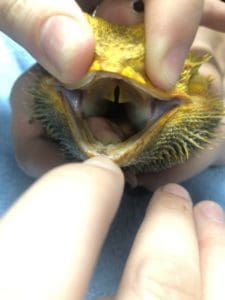 A healthy bearded dragon’s mouth |
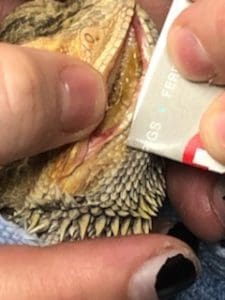 A bearded dragon with severe periodontal disease |
Signs maybe subtle like drooling, not holding the mouth closed properly, change in the lip margin, and decreased appetite activity. Some animals show no signs at all and only an oral exam will reveal lesions like swellings, abscesses, reddened gums, and sometimes even bleeding. More severe signs include lip deformities, swellings of the jaw, and oral discharge.
Diagnostics
The primary diagnostic is a good physical exam and review of husbandry. After this general health screening to test for parasites or other diseases is recommended such as intestinal parasite screening, a complete blood count, and a blood chemistry. Diagnostic imaging will help determine the severity of the lesions and if underlying bone is affected. Radiographs and CT may be recommended for this. Culture and sensitivity of affected areas will help identify involved bacteria and fungus and guide judicious antimicrobial therapy. In some cases, histopathology may be required to examine the tissues and determine the underlying cause.
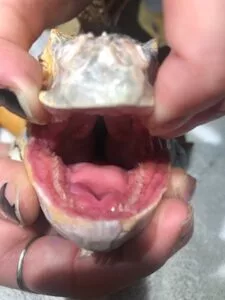
An adult green iguana with stomatitis
Treatment
Husbandry optimization is key for any case from mild to severe. Reptiles immune system and metabolism are tied to being in the correct temperature and, to a certain degree, humidity. Being in the optimal conditions will help promote healing.
Medically, many of these reptiles need to be sedated or anesthesthetized for treatment. While under the oral cavity will be flushed with an antimicrobial solution, necrotic or devitalized tissue will be debrided, and (in cases of periodontal disease) calculus will be removed with dental equipment. Some severe cases require placement of a tube to facilitate feeding by bypassing the oral cavity. All of these animals require continued topical antimicrobial therapy. Most of these animals also require systemic antibiotics. Pain medication will be prescribed as needed.
Prognosis
Prognosis is completely dependent on the severity and chronicity of the lesions. Early lesions can often be reversed. Once the infection has caused damage to the bone or gingival recession it is often a matter of management rather than cure.
Prevention
Ensuring that your lizard is housed in the proper environment and fed an appropriate diet are the best things you can do the maintain their oral health. Regular veterinary exams also allow for early detection of oral disease so that treatment can be initiated before permanent changes occur.
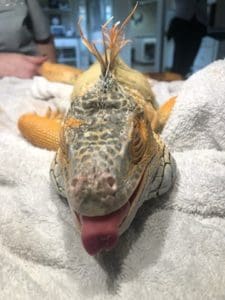
Sources:
Mader’s Reptile and Amphibian Medicine and Surgery, 3rd edition
Reptile Dentition: The Details on Reptile Teeth from Reptiles Magazine May 2019
Dentition in Mammals | Vertebrates | Chordata | Zoology from Zoology Note
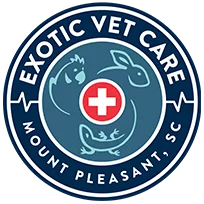
About Us
Our exotic animal hospital is dedicated exclusively to the care of birds, exotic small mammals, reptiles, and even fish! We can offer everything your pet needs for a healthy and happy life, from wellness care and grooming to diagnostics and dentistry, but we can also provide emergency care during our opening hours, along with more specialized treatment for referred patients.
